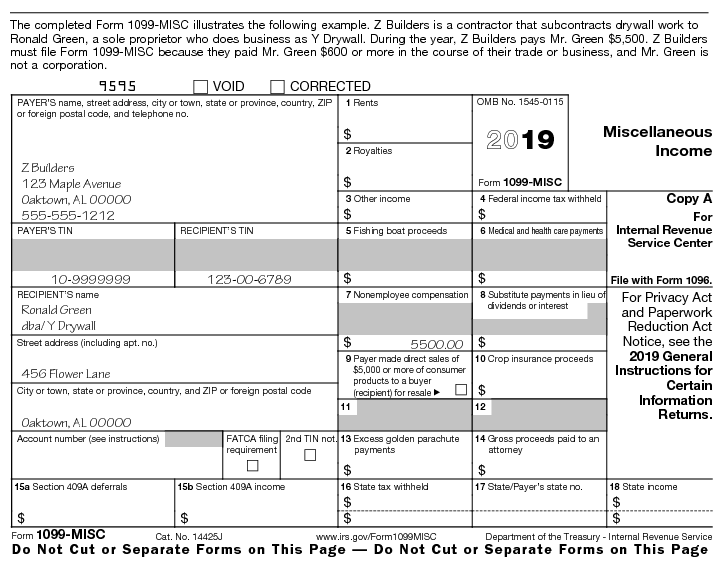Can an Individual Issue a 1099-C to Another Individual?
When it comes to tax reporting, the 1099-C form is often associated with businesses and corporations. However, there are certain circumstances where individuals may also need to issue a 1099-C. In this article, we delve into the specifics of 1099-C issuance and explore whether individuals can issue this form to other individuals.
What is a 1099-C Form?
Understanding the 1099-C
A 1099-C form is a tax document that reports the cancellation of debt. It is typically issued by creditors to debtors when a debt is forgiven, discharged, or becomes uncollectible. The form provides details of the canceled debt, including the amount, date of cancellation, and any interest accrued.
The 1099-C form is primarily used to inform the debtor of the income they may need to report on their tax return. Depending on the circumstances, the canceled debt may be considered taxable income, subject to income tax.
Can an Individual Issue a 1099-C to Another Individual?
Individuals Issuing 1099-C Forms
Generally, individuals are not required to issue 1099-C forms unless they are acting as creditors in a business or lending capacity. However, there are limited exceptions to this rule, where individuals may need to issue a 1099-C:
- Personal Loans: If an individual makes a personal loan to another individual and the loan is forgiven or becomes uncollectible, the lender may need to issue a 1099-C.
- Business-Related Debt: If an individual engages in a business transaction with another individual and the debt is canceled or forgiven, a 1099-C may be required.
Reporting and Tax Implications
When an individual issues a 1099-C to another individual, both parties have specific reporting requirements:
- Debtor: The debtor must report the canceled debt as income on their tax return, unless it is excluded from income under specific tax laws.
- Creditor: The creditor must file a copy of the 1099-C with the IRS and provide a copy to the debtor.
The tax implications of debt cancellation vary depending on the circumstances and the type of debt involved. It is recommended to consult with a tax professional for personalized guidance.
Latest Trends and Developments
Recent Updates and Insights
The IRS has recently issued updated guidance on 1099-C reporting, clarifying certain requirements and providing additional information for taxpayers. These updates include:
- Threshold Changes: The threshold for reporting canceled debt on Form 1099-C has been increased to $600 for debts canceled after December 31, 2021.
- Electronic Filing: The IRS encourages electronic filing of 1099-C forms to ensure accuracy and timely processing.
- Penalties: Failure to comply with 1099-C reporting requirements can result in penalties for both the creditor and the debtor.
It is important for individuals to stay informed about the latest developments in 1099-C reporting to ensure compliance with tax regulations.
Tips and Expert Advice
Practical Guidance and Insights
Here are some tips and expert advice to consider when dealing with 1099-C forms as an individual:
- Proper Documentation: Maintain clear and accurate records of any loans or debts involving other individuals.
- Consult a Tax Professional: Seek professional guidance from a tax accountant or attorney to navigate the complexities of tax reporting.
- Timely Filing: File 1099-C forms by the required deadlines to avoid potential penalties.
- Be Aware of Tax Implications: Understand the tax consequences of debt cancellation and report any taxable income accurately.
Following these tips can help individuals ensure proper compliance and avoid any potential issues related to 1099-C reporting.
FAQs
Common Questions and Answers
Q: Do I need to issue a 1099-C if I forgive a personal loan to a friend?
A: Yes, if the amount of the forgiven debt is $600 or more, you may need to issue a 1099-C to your friend.
Q: Can I deduct the amount of debt I canceled on my tax return?
A: Generally, you cannot deduct the amount of debt you cancel as a creditor. However, certain exceptions may apply, so consult with a tax professional for specific guidance.
Q: What is the penalty for not filing a 1099-C form?
A: The penalty for not filing a 1099-C form can vary depending on the circumstances, but it can range from $50 to $280 per form.
Conclusion
Understanding the intricacies of 1099-C forms is crucial for individuals who may need to issue or receive them. While individuals are generally not required to issue 1099-C forms, there are certain exceptions where it may be necessary. By adhering to the reporting requirements and seeking professional guidance when needed, individuals can ensure compliance and avoid any potential tax-related issues. It is important to note that tax laws and regulations can change over time, so staying informed and seeking up-to-date information is essential.
If you have any further questions or need personalized advice, consider consulting with a tax professional who can provide tailored guidance based on your specific circumstances.

Source Image: www.legalzoom.com

Source Image: www.legalzoom.com

Source Image: www.legalzoom.com
Thanks for your energetic exploration of this content. Can An Individual Issue A 1099-C To Another Individual, is a great source for broadening your insight.